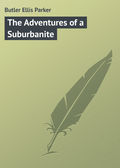
Butler Ellis Parker
That Pup
“I wish I could,” said Murchison wistfully, “but I can’t. I want to get rid of Fluff, and so does Brownlee, and so does Massett, but I can’t think of a way to get rid of him, and neither can they.”
“Murchison,” I said, with some asperity, for I hate a man who trifles, “if I really thought you and Brownlee and Massett were as stupid as all that, I would be sorry I moved into this neighborhood, but I don’t believe it. I believe you do not mean to get rid of Fluff. I believe you and Brownlee and Massett want to keep him. If you wanted to get rid of him, you could do it the same way you got him.”
“That’s an excellent idea!” exclaimed Murchison. “That is one of the best ideas I ever heard, and I would go and do it if I hadn’t done it so often already. As soon as Brownlee suggested that idea I did it. I sent Fluff by express to a man – to John Smith – at Worcester, Mass., and when Fluff came back I had to pay $8.55 charges. But I didn’t begrudge the money. The trip did Fluff a world of good – it strengthened his voice, and made him broader-minded. I tell you,” he said enthusiastically, “there’s nothing like travel for broadening the mind! Look at Fluff! Maybe he don’t show it, but that dog’s mind is so broadened by travel that if he was turned loose in Alaska he would find his way home. When I found his mind was getting so tremendously broad I stopped sending him to places. Brownlee – Brownlee knows all about dogs – said it would not hurt Fluff a bit; he said a dog’s mind could not get too broad, and that as far as he was concerned he would just like to see once how broad-minded a dog could become; he would like to have Fluff sent out by express every time he came back. He told me it was an interesting experiment – that so far as he knew it had never been tried before – and that the thing I ought to do was to keep Fluff traveling all the time. He said that so far as he knew it was the only way to get rid of Fluff; that some time while he was traveling around in the express car there might be a wreck, and we would be rid of Fluff; and if there wasn’t a wreck, it would be interesting to see what effect constant travel would have on a coarse dog. He said I might find after a year or two that I had the most cultured dog in the United States. Brownlee was willing to have me send Fluff anywhere. He suggested a lot of good places to send dogs, but he didn’t care enough about dog culture to help pay the express charges.”
“I see, Murchison,” I said scornfully, “I see! You are the kind of a man who would let a little money stand between you and getting rid of a dog like Fluff! If I had a dog like Fluff, nothing in the world could prevent me from getting rid of him. I only wish, he was my dog.”
“Take him!” said Murchison generously; “I make you a full and free present of him. You can have that dog absolutely and wholly. He is yours.”
“I will take the dog,” I said haughtily, “not because I really want a dog, nor because I hanker for that particular dog, but because I can see that you and Brownlee and Massett have been trifling with him. Bring him over in my yard, and I will show you in very short measure how to get rid of Fluff.”
That afternoon both Brownlee and Massett called on me. They came and sat on my porch steps, and Murchison came and sat with them, and all three sat and looked at Fluff and talked him over. Every few minutes they would – Brownlee and Massett would – get up and shake hands with Murchison, and congratulate him on having gotten rid of Fluff, and Murchison would blush modestly and say:
“Oh, that is nothing! I always knew I would get rid of him.” And there was the dog not five feet from them, tied to my lawn hydrant. I watched and listened to them until I had had enough of it, and then I went into the house and got my shotgun. I loaded it with a good BB shell and went out.
Fluff saw me first. I never saw a dog exhibit such intelligence as Fluff exhibited right then. I suppose travel had broadened him, and probably the hydrant was old and rusted out, anyway. When a man moves into a house he ought to have all the plumbing attended to the first thing. Any ordinary, unbroadened dog would have lain down and pulled, but Fluff didn’t. First he jumped six feet straight into the air, and that pulled the four feet of hydrant pipe up by the roots, and then he went away. He took the hydrant and the pipe with him, and that might have surprised me, but I saw that he did not know where he was going nor how long he would stay there when he reached the place, and a dog can never tell what will come handy when he is away from home. A hydrant and a piece of iron pipe might be the very thing he would need. So he took them along.
If I had wanted a fountain in my front yard, I could not have got one half as quickly as Fluff furnished that one, and I would never have thought of pulling out the hydrant to make me one. Fluff thought of that – at least Brownlee said he thought of it – but I think all Fluff wanted was to get away. And he got away, and the fountain didn’t happen to be attached to the hydrant, so he left it behind. If it had been attached to the hydrant, he would have taken it with him. He was a strong dog.
“There!” said Brownlee, when we had heard the pipe rattle across the Eighth Street bridge – “there is intelligence for you! You ought to be grateful to that dog all your life. You didn’t know it was against the law to discharge a gun in the city limits, but Fluff did, and he wouldn’t wait to see you get into trouble. He has heard us talking about it, Murchison. I tell you travel has broadened that dog! Look what he has saved you,” he said to me, “by going away at just the psychological moment. We should have told you about not firing a gun in the city limits. You can’t get rid of Fluff that way. It is against the law.”
“Yes,” said Massett; “and if you knew Fluff as well as we do you would know that he is a dog you can’t shoot. He is a wonderful dog. He knows all about guns. Brownlee tried to make a duck dog out of him, and took him out where the ducks were – showed him the ducks – shot a gun at the ducks – and what do you think that dog learned?”
“To run,” I said, for I had heard about Brownlee teaching Fluff to retrieve. Brownlee blushed.
“Yes,” said Massett, “but that wasn’t all. It doesn’t take intelligence to make a dog run when he sees a gun, but Fluff did not run like an ordinary dog. He saw the gun and he saw the ducks, and he saw that Brownlee only shot at ducks when they were on the wing. And he thought Brownlee meant to shoot him, so what does he do? Stand still? No; he tries to fly. Gets right up and tries to fly. He thought that was what Brownlee was trying to teach him. He couldn’t fly, but he did his best. So whenever Fluff sees a gun, he is on the wing, so to speak. You noticed he was on the wing, didn’t you?”
I told him I had noticed it. I said that as far as I could judge, Fluff had a good strong wing. I said I didn’t mind losing a little thing like a hydrant and a length or two of pipe, but I was glad I hadn’t fastened Fluff to the house – I always liked my house to have a cellar – and it would be just like Fluff to stop flying at some place where there wasn’t any cellar.
“Oh,” said Massett, “he wouldn’t have gone far with the house. A house is a great deal heavier than a hydrant. He would probably have moved the house off the foundation a little, but, judging by the direction Fluff took, the house would have wedged between those two trees, and you would have only lost a piece of the porch, or whatever he was tied to. But the lesson is that you must not try to shoot Fluff unless you are a good wing shot. Unless you can shoot like Davy Crockett, you would be apt to wound Fluff without killing him, and then there would be trouble!”
“Yes,” said Murchison, “the Prevention of Cruelty to Animals folks. There is only one way in which a dog can be killed according to law in this place, and that is to have the Prevention of Cruelty to Animals folks do it. You send them a letter telling them you have a dog you want killed, and asking them to come and kill it. That is according to law.”
“That,” I said firmly, “is what I will do.”
“It won’t do any good,” said Murchison sadly; “they never come. This addition to Gallatin is too far from their offices to be handy, and they never come. I have eighteen deaths for Fluff on file at their offices already, and not one of them has killed him. When you have had as much experience with dogs as I have had you will know that the Prevention of Cruelty to them in this town does not include killing them when they live in the suburbs. The only way a dog can die in the suburbs of Gallatin is to die of old age.”
“How old is Fluff?” I asked.
“Fluff is a young dog,” said Brownlee. “If he had an ordinary dog constitution, he would live fifteen years yet, but he hasn’t. He has an extra strong constitution, and I should say he was good for twenty years more. But that isn’t what we came over for. We came over to learn how you mean to get rid of Fluff.”
“Brownlee,” I said, “I shall think up some way to get rid of Fluff. Getting rid of a dog is no task for a mind like mine. But until he returns and gives me back my hydrant, I shall do nothing further. I am not going to bother about getting rid of a dog that is not here to be got rid of.”
By the time Fluff returned I had thought out a plan. Murchison had never paid the dog tax on Fluff, and that was the same as condemning him to death if he was ever caught outside of the yard, but when he was outside he could not be caught. He was a hasty mover, and little things such as closed gates never prevented him from entering the yard when in haste. When he did not jump over he could get right through a fence. But to a man of my ability these things are trifles. I knew how to get rid of Fluff. I knew how to have him caught in the street without a license. I chained him there.
Brownlee and Massett and Murchison came and watched me do it. Our street is not much used, and the big stake I drove in the street was not much in the way of passing grocery delivery wagons. I fastened Fluff to the stake with a chain, and then I wrote to the city authorities and complained. I said there was a dog without a license that was continually in front of my house, and I wished it removed; and a week or so later the dog-catcher came around and had a look at Fluff: He walked all around him while Massett and Brownlee and Murchison and I leaned over our gates and looked on. He was not at all what I should have expected a dog-catcher to be, being thin and rather gentlemanly in appearance; and after he had looked Fluff over well he came over and spoke to me. He asked me if Fluff was my dog. I said he was.





